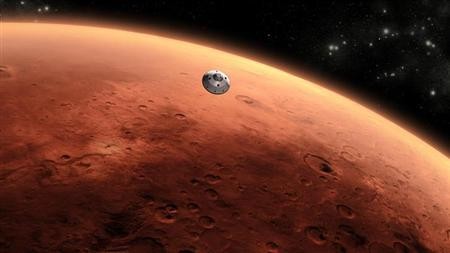University scientists have proposed a new method to search for alien life on Mars. It would combine improved extraterrestrial search technology, and more solid proof that ancient aliens once lived on the red planet.
Alison Olcott Marshall and Craig Marshall, a husband-wife scientific team at the University of Kansas (KU), have been improving how scientists detect condensed aromatic carbon, a key chemical in astrobiology, according to First Post.
The Marshalls have discovered the effective method of combining Raman spectroscopy and "gas chromatography-mass spectrometry," according to Red Orbit. It effectively locates the source of carbon rocks.
Previous Raman spectroscopy had only been performed on manmade salts and minerals. However, the KU scientists tested their new method at a Mars-like field site on Earth.
Today's Raman spectroscopy can already detect carbon in the search for life on Mars. However, new technology is needed to discover the source of carbon.
Craig explained that in Raman spectroscopy a laser zaps a sample, causing molecules within the sample to vibrate. Scientists can then identify inorganic materials and organic materials, by measuring the vibration frequencies.
The problem is that all carbonaceous material contains the same structure and chemicals. For this reason, new technology is required to find conclusive proof that Mars once contained ancient exterritorial life.
NASA and the European Space Agency (ESA) have recently used unmanned probes to complete missions to Mars. They have discovered that water, a key component of life, exists on the planet.
Alison, a KU geology professor, said that recent "very exciting" scientific findings about Mars have revealed that it once contained Earth-like water. The H20 was flowing, had a near-neutral pH, and was low-saline.
This scientific discovery has convinced more researchers that extraterrestrial life once existed on Mars. However, most scientists agree that it unlikely exists on the surface today, due one key factor: its harsh environment.
The KU scientists still need more solid proof of life on Mars. Craig explained that in order to confirm Mars aliens, scientists will probably discover fossil remains that extraterrestrials once produced.
Scientists could then analyze such evidence. However, this will require new tech gadgets in the search for extraterrestrials on Mars.


